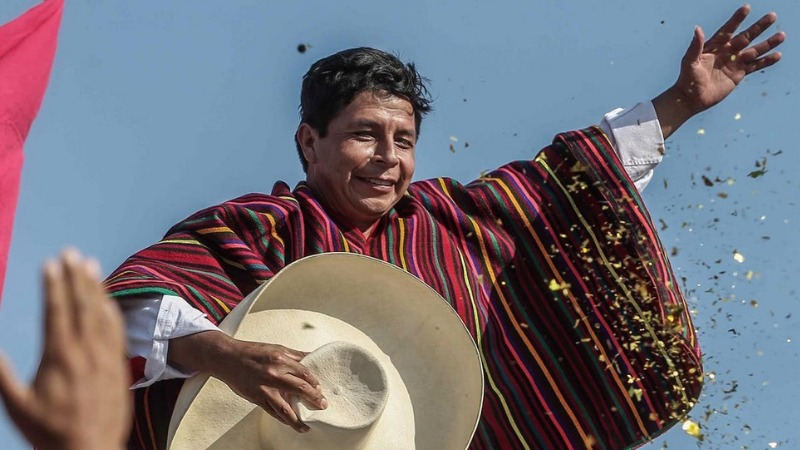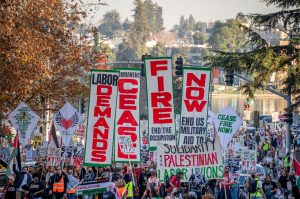More than 25 million Peruvians elected their next president this Sunday in a polarized election. The progressive Pedro Castillo and the ultra-neoliberal conservative, Keiko Fujimori, arrived at the polls practically tied, according to the latest polls. The rural teacher, Castillo, won the first round held on April 11 with 19 percent of the votes, followed by Fujimori, the daughter of the former far-right president Alberto Fujimori, who received 13 percent of the votes.
After days of close counting, Pedro Castillo has emerged as the virtual winner of the runoff election, surpassing the right-wing Fujimori by 71,000 votes in the final stretch of the vote count.
According to data provided by the National Office of Electoral Processes (ONPE), with 99.79 percent of the votes counted, Pedro Castillo of Peru Libre won 8,735,448 votes (50.2 percent), while Keiko Fujimori, of Fuerza Popular (Popular Force), obtained 8,663,684 votes, equivalent to 49.79 percent.
While for a short time it looked as though Fujimori could have narrowed the gap between her and Castillo, which had reached more than 110,000 votes on Tuesday, the number of envelopes still to be counted makes it likely that Castillo’s victory is already irreversible.
Who is Pedro Castillo?
A primary school teacher, Castillo stood out as a union leader who organized various strikes of education workers, most notably, the 2017 teachers’ strike that lasted three months and demanded salary improvements and elimination of performance evaluations for teachers that had been pushed by the neoliberal government of Pedro Pablo Kuczynski. During the 2017 strike, Castillo led an opposition faction to the traditional Single Union of Education Workers of Peru (Sutep). At that time, he was accused of maintaining ties with the Movement for Amnesty and Fundamental Rights (Movadef), the political arm of the armed group Sendero Luminoso, or Shining Path, as part of a smear campaign — an allegation Castillo has always denied.
Castillo makes for an attractive candidate for the popular sectors because he is perceived by them as a consistent militant. Castillo is not only a leader of the majority sector of the Peruvian teachers’ union, but is also perceived as someone alien to the traditional politicians so much questioned by the population. He currently represents the Peru Libre party, which has a progressive ideology and regional origin.
In his proposed government plan, there is the idea of modifying the Political Constitution of the country, mainly with the objective of carrying out an economic reform in which the State would assume the role of an entrepreneur to compete with the private sector.
The proposal also includes nationalizing companies in various economic sectors such as mining, oil, hydro-energy, gas, and communications.
However, Castillo’s programmatic proposals and political strategy are based on reformist visions that, despite his campaign proposals to change the Constitution, to govern with a teacher’s salary, and to reduce the salary of congressmen, do not question the Peruvian capitalist structure.
Within Castillo’s plan there is no radical response to labor precariousness and labor exploitation, nor does he seek a real confrontation with the big economic groups that control the country. As election day approaches, Castillo has been toning down his timid economic proposals; he recently stated that, if elected, he would not charge a tax on wealth.
In his speeches, Castillo, furthermore, never made mention of or addressed the working class. He appealed to the unity of all Peruvians, speaking of the “people” or the “homeland,” thus intentionally hiding the class differences that condition the economic, social, and political dynamics in dependent capitalist countries like Peru.
Pedro Castillo frequently appeals to an indigenous discourse, defining himself as “Tawantinsuyano” (in reference to the ancient Inca Empire). He has strong support among the peasant sectors, the urban popular sectors, and the teaching profession. Yet, his government plan he does not break with the big foreign businessmen or the national bourgeoisie. Castillo and his political grouping speak of changing the 1993 Constitution, but he intends to work from within the institutions imposed by the 1993 regime (installed by Fujimori) and without the mobilization and workers’ and popular self-organization, which reduces this slogan to a mere constitutional reform.
Peru Decides
On Sunday night, the pollster Ipsos and the first quick count of votes showed Keiko Fujimori winning by a margin of less than 0.6 percent. As the hours went by, however, Castillo began to take the lead, especially as results came in from rural areas where he is strongest. From that moment on, Castillo never lost the lead again.
Since Sunday night, supporters of both candidates have gathered at their respective headquarters. On Tuesday night, the bench of Peru Libre, the party for which Castillo was candidate, issued a statement rejecting the declarations of Keiko Fujimori, who, since Monday night, has been denouncing the irregularities and alleging elements of fraud, although without presenting evidence.
On social media, Castillo himself has called for calm and asked to wait for the final results of the ONPE, defending his votes.
The endorsement of Castillo represents an aspiration for change of the most underprivileged sectors, who no longer believe Fujimori despite the fact that, in the last stretch, she led a demagogic and populist campaign promising everything to win the votes of the popular sectors that live in deplorable conditions as a consequence of the economic crisis. If Castillo’s victory is ratified, which seems likely, he will be faced with the challenge of governing a country greatly polarized by the deep institutional, economic, and health crises aggravated by the pandemic — problems that are increasingly difficult to manage without breaking from capitalism and imperialism.
Translated and edited by Sou Mi











